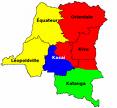War in the Congo: The Ambitions of Nkunda and his Anglo-American Allies

Every day the hardships and cruelties worsen in the Democratic Republic of the Congo (former Zaire). Many of its citizens —those who do not benefit from the theft of the country’s minerals by foreign transnationals, with the support of local allies— wonder how many days more they will have to live.
Unfortunately, the war will continue for those who have to abandon their homes, or take refuge in neighboring countries, or survive from the aid offered by international relief organizations, which are hypocritically financed by the same countries that invest in the conflict. Should negotiations open between the government of Kinshasa and the seditious Laurent Nkunda, who threatens to extend the violence across the whole nation, the outcome cannot be foreseen optimistically given the dissident former general’s demands.
On Sunday 16, in a meeting with United Nations Special Envoy Olusegun Obasanjo, Nkunda expressed his willingness to unite and serve the national army so as to continue in “a career that he loves.” To do this he requested certain guarantees from the African Union and the UN.
It seems that the turbulent leader toned down his demands. First, in an interview with the Spanish newspaper El Pais, “tossing flowers in the mouth” of Congolese President Joseph Kabila, Nkunda said he was prepared to be the ruler and help the country grow and develop, although he would have to achieve that high position with a gun in his hand. Then his discourse changed: now he wants to unite with the troops that represent and defend the government that has had to face so much. Nkunda says that he wants to join with those men who were his enemies on the battlefield.
This is a bit contradictory… isn’t it? Or is it that in his mind —and in those of the American owners of the transnationals who call the shots in this war— there is no idea more “grandiose” than putting an end to Kabila from within the ranks of his own administration?
It is difficult to believe in the good will of someone who does not even honor his word to respect the ceasefire unilaterally declared by the Congolese government, and who continued expanding his terror over different localities in the east of the nation in his impetuous advance against Kabila.
Moreover, that story about joining and serving the national army is already quite old. In 2003, after one of the bloodiest episodes of the war that had cost the life of about four million people, and one in which Nkunda, an ally of Rwanda and West, launched a campaign against President Laurent-Désiré Kabila —the father of the current leader and the person that Washington saw as following in the steps of national-democratic leader Patricio Lumumba, given the elder’s opposition to the looting of the wealth of the country— the seditious Nkunda joined the national army according to the signed peace agreements that called for the armed rebel groups to join the army. However, in 2004, when he had then been promoted to general, Nkunda rebelled against Joseph Kabila.
Kinshasa does not want to be hit twice with the same stone. For that reason it has refused to hold special negotiations with Nkunda —requested again on Saturday by the rebel during his second meeting with Obasanjo— who enjoys the Western support that Kabila does not have. In addition, the Congolese president rekindled the scorn of the transnationals by re-evaluating many of the mining contracts; he wants to do business with China, viewed by the elite powers as their main competitor in Africa.
What does Nkunda have to take power in Kinshasa, other than the friendly hands of the transnationals? With his thick file of violations and war crimes, that record will not win him the office in the Kinshasa presidential palace, at least not by the ballot box, as did Kabila in 2006 with the support of a people weary of war.
Therefore, if Kinshasa maintains its position, all that Nkunda can do is remain entrenched. Of course, he knows that the rewards of achieving his desires would be from the granting of concessions for the exploitation of minerals by those who have stayed by his side all this time.
Email: [email protected]
Translated from the Spanish.

